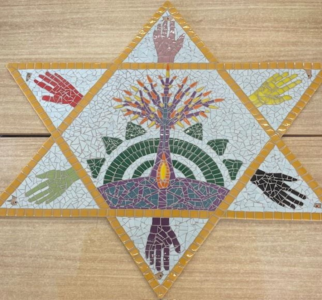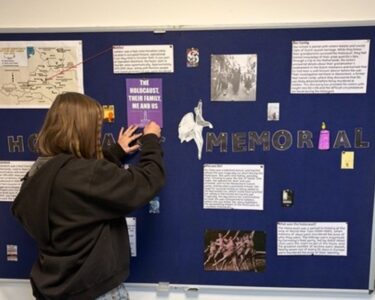We are delighted to announce our 25th Quality Mark Beacon School: Trinity Catholic School. Our Quality Mark review process confirms the schools’ quality provision for and evolving specialism in Holocaust education. Holocaust teaching and learning is effective and contributing positively to policy, curriculum, pedagogy and practice, supporting ongoing school improvement and the school’s ethos. As a UCL Beacon School, Trinity Catholic offers learning experiences that are research informed and result in outcomes that are empathetic and insightful, where students have been inspired and empowered by knowledge and understanding of the Holocaust and, in partnership, Trinity Catholic School has innovated and fast become a true ‘Beacon’.
Trinity Catholic School is an 11-18, mixed gender, non-selective Roman Catholic secondary school in Warwickshire.
The UCL Centre for Holocaust Education extend heartfelt congratulations to School Improvement Lead, Ms Samirah Roberts, and the whole school community on this prestigious achievement and take this opportunity to recognise the close cooperation with colleagues from across the school that enabled a wide impact on teaching practice in diverse spaces and with pupils. This was underwritten by the commitment of the then[1] headteacher Ms Bridget Morris, who were supportive of the Lead Teachers and schools pioneering work and network-building as a Beacon School.
The Quality Mark identifies and celebrates many examples of best practice and innovation at Trinity Catholic School and recognises areas for ongoing development and internal reflection, but we highlight here, by way of summary, 9 key strengths and areas of best practice following a highly successful, positive, and enjoyable review process:
- The school’s quality provision for and evolving specialism in Holocaust education is contributing to a curriculum that informs, engages, empowers, and inspires its learners, resulting in meaningful outcomes, both academic and in terms of personal development, character, safeguarding and civics.
- Without question, Trinity students are magnificent, wonderful ambassadors, knowledgeable, articulate and insightful advocates of quality Holocaust education provision and its impact. The student voice was compelling and thought-provoking. They are genuinely interested in and enthused by teaching and learning about the Holocaust, their knowledge and understanding is sophisticated, nuanced and students can readily apply their learning to the modern world, their local context and global community. Trinity learners enjoy studying the Holocaust, are actively engaged, recognise the skill, care, passion, and commitment of their teachers, and are curious and want to know more. There are strong relationships developed over time between students, teachers and support staff – teachers know their students well, every learner is unique and matters, but there is a strong sense the school is a community, ‘learning together’.
- The intent and implementation of the History curriculum, and, increasingly, across a range of subject areas, especially in Humanities, bares many of the hallmarks of deep thinking, planning, innovation, and quality curriculum design. It’s focus on developing student literacy and oracy skills, through the vocabulary books in the lessons, designed to develop student ability to grapple with vocabulary, support engagement with complex texts and scholarship, whilst also providing the learning conditions that are high challenge, low threat, and thereby inclusive and accessible for all. Interleaving of knowledge was also a strength, contributing to strong student recall and ability to apply learning, in large part this is thanks to incredibly strong use of varied questioning and a variety of teacher talk.
- Mrs Debbie Hayden, The Beacon School Lead Teacher’s passion, commitment and dedication for the business of effective, quality provision for and experience of Holocaust T&L – she has found her purpose and is reflective and humble enough to look to ways to continue to grow and develop, both professionally and personally – a role model, respected colleague, a skilful and gifted classroom practitioner, who is ‘adored’ by students and so respected by parents and carers.
- Beacon School status is supported by Senior leaders and increasingly embedded within and seen as integral to the schools’ Catholic values educational vision, and inclusive culture, but also shared across the Our Lady of the Magnificat MAT and recognised by the local community. Leaders recognise the need for continued professional development to invest in staff and thereby further equip their community of practice and build capacity to ensure this work embeds, adapts, and flourishes over time. They are rightly proud of all that has been achieved to date, but acknowledge the Quality Mark is not a destination, but an ongoing journey.
- The scheme of learning is robust and engaging and respectful to its disciplinary intent. Its enquiry question demands a range of historical thinking, and affords opportunities to explore causation, continuity, significance and interpretation, but also speaks to the culture and Catholic values of the school – and the sense of shared educational vision that is rooted in the community and context is serves – that includes Holocaust education, both academic and holistic. Colleagues recognise the scheme is a working document and open to ongoing review and refinement – and there was clear progression in thinking from initial draft, submission at end of year and in developments since.
- Beacon School status plays a crucial part in securing excellent SMSC provision and this should be widely celebrated. Beacon School work at Trinity Catholic School contributes to personal development, RE and plays its part in liturgy and worship, and supports safeguarding and civics in a powerful and meaningful way, drawing on cognitive and affective approaches. Collectively, the holistic impact is significant and transformative.
- Teaching and learning about the Holocaust is informed by research and embedded in UCL Centre pedagogic principles, and where possible the school embraces opportunities to outwardly engage – for example, working on ‘The Holocaust, Their Family, Me and Us’ project with a memorial ‘Bud and Blossom Garden’ and incredible mosaic made possible with local community support, marking Genocide Prevention Day, Human Rights Day, working in partnership with author Tom Palmer and more. The school are keen to embrace and facilitate opportunities and experiences for students, parents and carers and staff alike – a true ‘Beacon’.
- Ongoing commitment to building a community of practice, through research informed CPD and professional development opportunities.
We would like to take this opportunity to acknowledge one uniquely distinctive contribution to Trinity’s Quality Mark review process – the insights shared by parents and carers. Reviewer, Nic Wetherall reflects:
“One of the most memorable and impactful contributions throughout the process was the contribution of parents and carers. The reflective insights revealed incredible pride in their young people and their engagement in the Holocaust related learning opportunities across Trinity and they spoke with such passion, warmth and authenticity of the learning conversations that had taken place at home because of those meaningful and powerful educational experiences. The conversation revealed immense gratitude for the Beacon work of the school and the respect, admiration and affection with which Mrs Hayden is held.
Never before has a school suggested a parent voice component to the UCL Quality Mark review process – and as a result of this review, where the parental insights were so rich, honest, revealing, deep and heartfelt, as a Centre, we will look to incorporate something of this in future reviews.
Trinity parents and carers recognise this work speaks to the inclusivity of Beacon School journey and the extent to which it is embedded in the school’s values and culture. Indeed, after a period of challenge and change, that a parent would say “…ours is kind school”, it something that will remain with me a long, long time.
I was moved to tears, not least owing to references to the #HtFMeUs project and the memorial garden. The fact parents gave up their time, whether at work or at home, to speak to me and celebrate Trinity’s Beacon School Journey spoke volumes. It was a privilege, so my heartfelt thanks to those parents and carers who contributed.”
The Centre’s team commend all at Trinity Catholic School for their evolving innovative and engaging provision and practice in Holocaust education, their desire to embed research informed practice, commitment to ongoing professional development, pastoral care and safeguarding, civics and leadership – their compass for life. Their values of aspiration, integrity, resilience and respect are lived, not laminated, and a student captured that beautifully in an incredibly symbolic and insightful mosaic of respect, empathy, inclusion and welcome.
Becoming a Beacon School at any time, is a significant undertaking at any time – to do so within a context of a tough and ongoing post-pandemic world, and a time of immense challenge and stress within the education system, and to pursue, successfully, is even more impressive and commendable. Successful accreditation is testimony to sustained hard work and innovation. Quality Mark Reviewer, Nic Wetherall remarked:
“Remembering, teaching, talking and learning about the Holocaust is uncomfortable. At Trinity Catholic School, it is understood that as individuals, professionals, students, and as a community we must, today and every day, build social courage to ensure “Never Again” and tackle all forms of hate and work towards a safer, more inclusive world and society. The schools successful Quality Mark process offers a timely reminder of what a school, a teacher, and a community can do. It was a privilege and absolute pleasure to see all that has been achieved to date, but also refreshing to hear reflective, ambitious and innovative educators and reflective committed leaders consider next steps to ensure provision and practice continues to meet student and community evolving needs. Congratulations to all involved and special thanks to the students, parents and carers, who represented Trinity so brilliantly, and whose insights truly enriched the process, and thankyou to the remarkable educator that is Debbie Hayden – ‘the teacher we all wish we had’ – for her dedication, passion, integrity and ‘we will find a way’ attitude.”

The full Trinity Catholic School 2024 report, featuring extensive details of their strengths and identification of suggested developmental action points, will be available soon.
The UCL Quality Mark scheme is a great way to celebrate and share best practice and is both developmental and forward looking. Beacon School alumni considering undertaking the Quality mark process should contact Nicola Wetherall or read more here.
NB. Ms Morris has moved on from Trinity Catholic School since the Beacon School year. We thank her for her early support and contribution to the Beacon programme and enabling the Lead Teacher take up this opportunity.



